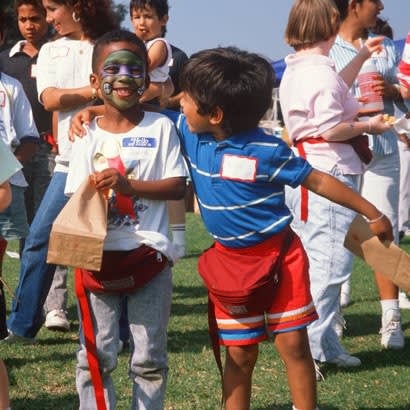
Pictured left: Young friends smile at a park celebration in Los Angeles, California. Photo by Joe Sohm.
For the last 10 years, “equity” has been a central focus of NRPA’s work. Our mission is to advance parks, recreation and environmental conservation efforts that enhance the quality of life for all people — putting equity squarely at the center of all we do. Across the profession, however, gaps remain in understanding how systemic racism, unfair power structures and a lack of cultural humility affect diversity, equity and inclusion in our spaces and programs. More than 30 percent of the population does not have access to a park within a 10-minute walk. Socioeconomic gaps have created barriers that result in many marginalized groups feeling unwelcome in park spaces. We estimate that as many as 100 million people — 30 percent of the U.S. population — lack access to the lifesaving benefits parks and recreation provides. We are striving for a future where everyone has fair and just access to quality parks and recreation.
We know park and recreation professionals are hungry for resources to build more inclusive environments. As a membership organization, it is NRPA’s responsibility to provide professionals with the tools they need to be champions of innovative and long-term solutions that ensure access for everyone. To identify what work was being done and what support agencies needed in order to prioritize diversity, equity and inclusion (DEI), NRPA sought feedback from the field through surveys and focus groups. The results of these surveys produced clear themes in response to how professionals understood their role in promoting DEI. While many professionals and agencies see the importance of formal DEI programs and policies, there is still some resistance to the role that DEI plays in the park and recreation industry.
We’ve outlined the three most common challenges we received in response to our push for inclusivity, along with our perspectives on each:
1. “You’re bringing politics in parks.”
Being aware of the inclusive principles and actively seeking more inclusive language is not about “politics” or being “politically correct.” It is about treating people with dignity and not making assumptions about a community. Park and recreation professionals play a vital role in meeting the evolving needs of their communities by fostering cultures that prioritize everyone’s wellbeing.
2. “Talking about race is inherently racist.”
When we say we can’t see race or racial differences, the intention may be to communicate that we don’t treat someone differently based on their race. Yet, that means we’re also choosing to ignore how a person’s race or identity is a defining characteristic of who they are, and that we’re choosing to ignore racial disparities and histories of violence against certain groups of people. We believe that to ignore how race has played a role in parks and recreation is to ignore the impacts of history. We must address the past to create a better future, and there is virtue and value in recognizing our differences so that we can build relationships despite them.
3. “Parks and recreation isn’t a place for these discussions.”
On the contrary, difference meets on the playground: we operate at the intersection of differences in race, gender identity, religion, socioeconomic status, geography, age and ability. Quality parks and recreation are essential to individual and community health, well-being and resilience. This is a critical time for parks and recreation to be having these discussions.
As the creators of community, park and recreation professionals are uniquely positioned to champion diversity, equity and inclusion within their agencies and communities. While there is still so much to achieve, even the smallest step in the fight toward equity and justice is never wasted. This is an exciting opportunity to reflect on your personal commitment to elevating fairness and justice through the lifesaving power of parks and recreation.
Shalini Mirpuri (she/her) is NRPA’s senior manager of education – diversity, equity and inclusion.

